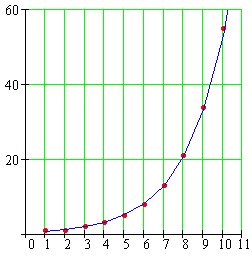3.7 Case Study: Population Modeling: Quiz
Problem 5
The growth of some populations is modeled by a pattern of numbers called the Fibonacci numbers. Consider a population of blue bunnies that begins with one pair of adults. Suppose that each pair of adults produces a pair (one male, one female) each 6 months. The immature pair grows to maturity in 6 months, joining the adult population in producing a new pair every 6 months thereafter.
The number of adult pairs counted each 6 months follows the sequence 1, 1, 2, 3, 5, 8, 13, ... . This is the Fibonacci sequence.
- How does the number of immature pairs relate to the number of adult pairs?
- How many adult pairs will there be at the end of 6 years?
- Graph the Fibonacci sequence, and the best-fitting exponential using the first 10 numbers in the sequence. How well does the exponential model the Fibonacci sequence?
Answers, problem 5
-
Each adult pair produces an immature pair, so the immature pairs lag the adults by 6 months. The number of immature pairs is therefore 0, 1, 1, 2, 3, 5, 8, ... .
- 144

The exponential fits the Fibonacci sequence very well.

